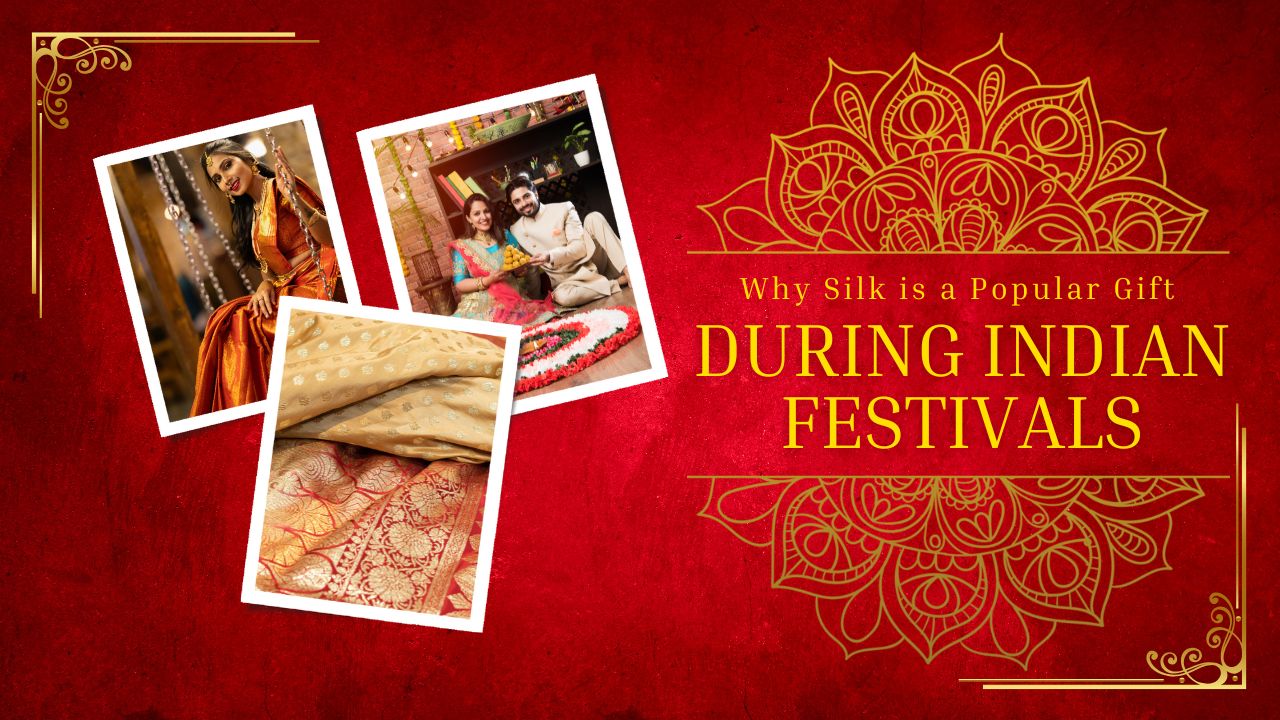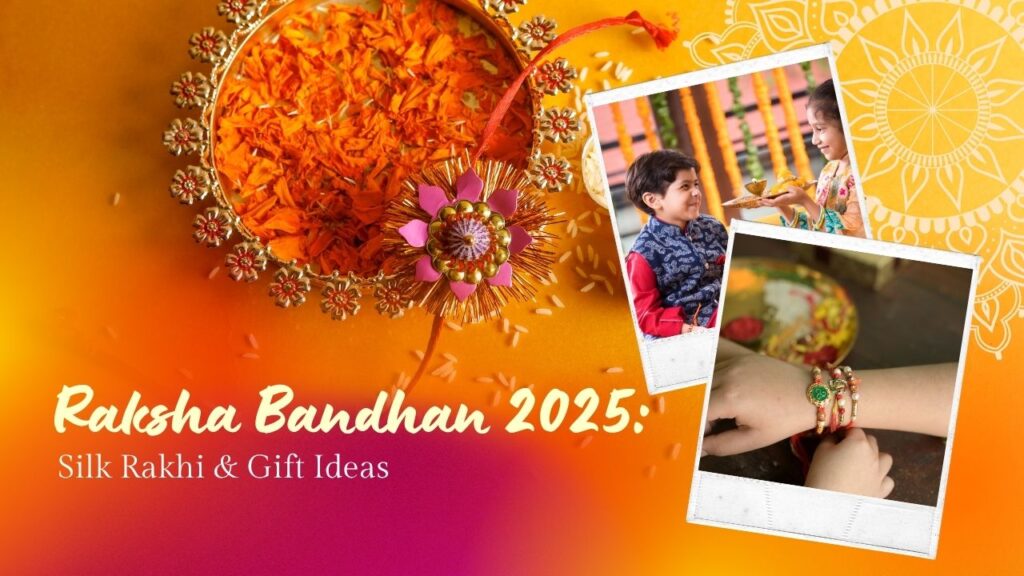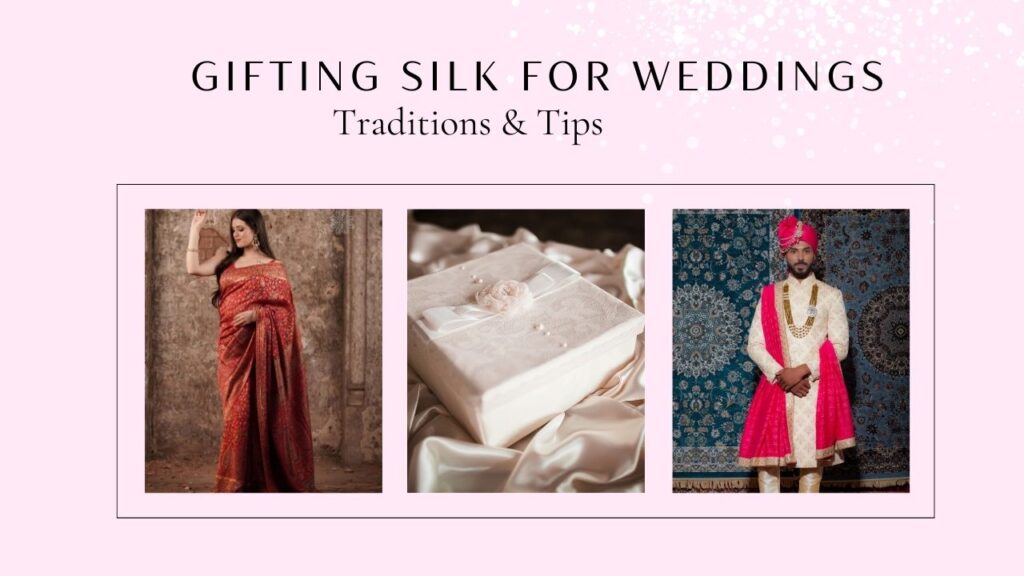Silk, sparkling with elegance and carrying timeless symbolism, has a very special place in Indian culture. Through the generations, gifting has remained a tradition in expressing love, respect, and goodwill, especially during festivals when gift-giving assumes a much deeper meaning and is reinforced with ceremonial importance.
Of the many choices made available by the market, silk continues to shine bright as a gift of choice and affection, appreciated for having the aura of royalty along with a rich history of devotion and craftsmanship. Now, let us see why silk is a popular gift during Indian festivals and how such traditions sustain the receiver and a whole lot of skilled artisans.
Historical and Cultural Significance of Silk in India
The silk story goes back to the very history of the subcontinent for millennia. Archeological evidence would put the use of silk textiles in India somewhere along with or prior to the Indus Valley civilization, placing mentions within ancient scriptures such as the Rig Veda or the Manusmriti that speak of silk as a precious material for clothing and rituals. Casually weaving its way down through history, places such as Bengal, Mysore, and South India have been known to keep alive the art of silk weaving from Mughal times and thereafter.
Symbolism of Silk in Indian Culture
Silk holds symbolic value in Indian culture. In Hinduism, silk sarees are pure and auspicious and are given to gods as offerings, becoming one of the ways of worship and respect. Its shiny-textured appellation stands for prosperity, purity, and celebration.
The patterns on a silk saree further enhance the spiritual and auspicious messages attached to every gift, such as the peacock for beauty and eternity, the lotus for purity, mangoes for prosperity, and elephants for power and wisdom. This is why silk is a popular gift during Indian festivals.
Source: Amazon
Why Silk Makes the Perfect Festival Gift
1. Symbol of Good Fortune
Silk spreads blessings, wealth, and happiness. Giving silk on the occasion of festivals is meant to assure the giver’s good luck, as well as that of the recipient.
2. Universally Cherished
Silk presents like sarees, dupattas, stoles, and shirts are loved by all. Therefore, silk is adequate for both friends and relations.
3. Practical and Lasting
Unlike perishable food and flowers, attire made of exquisite silk can be adored for years and eventually turned into an heirloom.
4. Reflects Respect and Affection
Their airy grandeur says they’re worthy of sincere thought and care. They reflect true esteem when given, with formal respect attached to the very act of gifting.
Popular Festivals Where Silk is Gifted
Silk plays a starring role in nearly all major Indian festivals and life events, including:
- Diwali: The festival of lights is, therefore, a time to bestow silk gifts to celebrate prosperity.
- Pongal & Sankranti: These harvest festivals from South India offer occasions for gifts of particular silk sarees with traditional motifs.
- Navratri & Durga Puja: Silk sarees are usually gifted to the ladies of the house, relatives, and friends, while new silks are worn daily.
- Weddings and Baby Showers: Silk is given householder blessings, especially the Kanchipuram saree, to the bride.
- Other Festivals: Raksha Bandhan, Eid, and regional housewarmings intermingle with the silk trade.
Types of Silk Gifts People Prefer
- Silk Sarees: The best ones are the much-famous Kanchipuram, Banarasi, Tussar, and Baluchari.
- Dupattas and Stoles: Light and elegant, this is a gift that goes well for any generation.
- Scarves and Shawls: A perfect fusion between modern and tradition, these are gifts that make a style statement yet are practical.
- Kurtas, Shirts, and Dhotis: These gifts, instinctively appealing, are just right for men and worth keeping the honor of human attention and tradition.
- Accessories: Silk cushion covers, purses, ties, and handkerchiefs can fill an abode or a wardrobe with festivity.
- Dress Materials and Home Décor: Silk fabric for tailoring or as decorative items is increasingly popular.
Supporting Artisans and Local Weavers
Gifting silk is congruent with tradition and serves to protect artisan livelihoods, wherein, in different parts of India, skilled artisans and weavers sustain themselves. These silk clusters in Karnataka, Tamil Nadu, Andhra Pradesh, West Bengal, Assam, and Jharkhand are known for some of those ancient weaving traditions that have been passed down and preserved through many family generations.
Tips for Choosing the Right Silk Gift
- Know the Recipient: Consider the colors, patterns, or types of silk that your recipient favors.
- Occasion Matters: Heavier sarees with intricate zari for weddings, lighter silks for festivals like Pongal.
- Authenticate: Check for silk marks or certifications that guarantee purity and handloom origin.
- Support Local: Purchase directly from artisan cooperatives or authorized retailers to empower traditional weavers.
- Care Instructions: Remember tips to care for silk, such as dry cleaning, storage, and protection from sunlight, to ensure longevity.
In a Nutshell
The reason why silk is a popular gift during Indian festivals is its cultural significance. Silk’s symbolism, its unique patterns, and deep cultural roots make it the perfect choice for gifting.
By choosing silk, you impart prosperity and joy to so many lives that shape this beautiful fabric, from countless hands and craft it into the splendor we so adore. Let each silk gift you give during the festive season stand for the heritage of the community that we all cherish.
FAQs: Why Silk is a Popular Gift During Indian Festivals
1. Why is silk considered auspicious in Indian culture?
Silk represents purity, prosperity, and divine blessings. It is employed in rites and sacred ceremonies and is bestowed upon deities with respect.
2. What makes silk a popular gift during festivals?
Silk stands for good fortune, culture, and pride. Its versatility and elegance make it an all-time favorite for every big occasion.
3. Is it appropriate to gift silk to both men and women?
Yes. Silk shirts, kurtas, dupattas, and sarees are appreciated by everyone across genders and ages.
4. How do I ensure the silk I buy is authentic?
Look for silk mark certification, purchase from reputed stores or cooperatives, and feel for the unique texture and sheen of genuine silk.
5. Are handloom silk products more expensive?
Handloom silk often costs more due to the labor-intensive craftsmanship and higher quality, but it supports artisans and offers unmatched exclusivity.
6. Can I gift silk items other than clothing?
Absolutely. Silk scarves, ties, stoles, cushions, and even home decor items make unique and elegant gifts.
7. What are the most popular silk types in India?
Mulberry, Tussar, Kanchipuram, Mysore, Banarasi, and Baluchari are among the most admired and gifted varieties.



